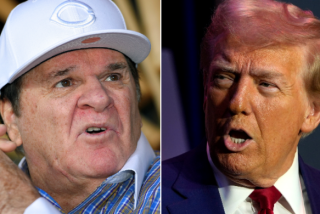Bush May Whiff if He Mediates Dispute
- Share via
CRAWFORD, Texas — Unlike in labor disputes involving major industries with deep effects on the national economy, the president has no formal place in settling a baseball strike. However, as a former team owner, President Bush occupies a unique position.
With players setting a deadline of Aug. 30 in their labor dispute with team owners, a strike would place Bush in a pressure-filled situation unlike any a president encounters.
Although he has not yet been asked to intervene in the impasse, said White House spokeswoman Claire Buchan, a baseball strike would bring him face to face with an emotional issue in which neither side enjoys wide popular support. He would be expected to exert the authority of his office--and his personal experience in major league baseball--to resolve the dispute quickly enough to put the pennant races back on track.
Before winning the Texas governorship in 1994, Bush was a managing partner of the Texas Rangers and was seen frequently in the stadium seats near the field, greeting fans and eating hot dogs.
His readiness to comment on baseball’s problems--”A lot of fans are going to be furious, and I’m one,” he said Friday without being asked--raised questions among veterans of past Democratic and Republican administrations in Washington.
One senior aide in previous Republican administrations said: “I would never have done that. He’s going to get himself sucked into negotiations.”
It was a trap into which President Clinton fell in 1994, and a move he quickly came to view as a mistake.
Confident of his ability to bring together the most aggressively disputatious of parties and find a workable compromise, Clinton met his match in the two sides of that year’s season-ending baseball strike. He quickly pulled the White House back from its initial efforts to settle the strike.
Recalling the experience on Friday, one senior Clinton aide said: “I’m not sure it was one of the smarter things he did.” The former White House official cautioned Bush against wading into the fracas.
“Of all the disputes in the world right now, the one I’d least want to be in the middle of is the Middle East. Second is the baseball situation,” he said. “As president, you don’t have a choice about the Middle East. Baseball is optional.”
Asked whether Bush should get involved in trying to resolve the dispute, he said: “The short answer is ‘don’t.’ ”
The former Clinton aide, who spoke on the condition of anonymity, said it was needlessly risky for Bush to place himself in the middle of an argument at this early date, and one for which no solution is apparent. It would lessen the president’s possible contribution later, he said, and because he had been a team owner, the players might view any White House role with suspicion.
It is a political risk too.
“Unless you have a positive solution, stay away, because there’ll be no heroes in this endeavor,” he said.
A baseball strike, or any such dispute involving professional sports, is likely to draw wider popular attention and emotion than any other effort to inject the White House in labor-management relations--for example, a steel or rail strike.
The White House has been tracking the baseball situation from a distance, one Bush aide said several weeks ago. But he made it clear at the time that the White House was uncertain just what role Bush would play, if any, if the players strike.
But by commenting on the strike deadline, Bush took a cautious step into the fray.
“It is very important for these people to get together,” the president said of the players and the owners. He added that whatever reason they come up with to not reach agreement, “it is bad for them not to reach an accord. They need to keep working.”
More to Read
Go beyond the scoreboard
Get the latest on L.A.'s teams in the daily Sports Report newsletter.
You may occasionally receive promotional content from the Los Angeles Times.










